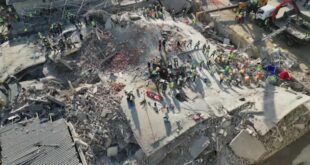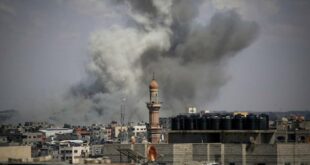No province or territory has opted to make the use of masks mandatory again

This is an excerpt from Second Opinion, a weekly analysis of health and medical science news emailed to subscribers. If you haven't subscribed, you can do that by clicking here.
-
Growing calls to reinstate mask mandates aren't being heeded by health officials.
-
But what impact would mask mandates across Canada actually have on the surge of RSV and flu straining children's hospitals?
-
Not all viruses are the same and mandating masks now is harder to justify.
Masks are an effective layer of protection in the fight against COVID-19 and have been essential throughout the pandemic, helping to prevent infection, slow transmission and make crowded indoor environments safer when used appropriately.
But while everyone is encouraged to wear a mask to protect themselves in certain situations during respiratory illness season, mandating them now is harder to justify for a wide range of reasons.
Not a single provincial and territorial chief medical officer in the country has opted to make the use of masks mandatory again, despite growing public pressure and calls from some media and front-line physicians for mask mandates to alleviate the strain on hospitals.
The top doctors in British Columbia, Ontario, Quebec, Alberta, Manitoba, Saskatchewan, Prince Edward Island and Newfoundland and Labrador have all said now is not the time to reinstate mask mandates, but continue to recommend masks to slow viral spread.
The question is, what impact would widespread mask mandates across Canada actually have on the surge in respiratory syncytial virus (RSV) in kids and the rapid return of the annual flu season currently overwhelming children's hospitals in much of the country?
WATCH | Provinces resist growing pressure for return of mask mandates:

Provinces resist mask mandates as respiratory infections rise
Health experts are pushing for masking in public as respiratory illnesses surge, but provinces including Quebec, Alberta and B.C. are resisting calls for renewed mask mandates.
"It's really not clear because RSV is being transmitted mainly in daycares and in young children and there we don't want to have mask mandates," said Dr. Caroline Quach-Thanh, a pediatric infectious diseases specialist at Montreal's Sainte-Justine children's hospital and the former chair of the National Advisory Committee on Immunization (NACI).
"We want children to be able to develop and sort of live a normal life as much as possible," she added."What you really have to do is decrease your number of contacts and make sure that when you're sick, you stay away. And if you can't stay away, then you wear a mask."
Not all viruses are the same
Mask mandates played a significant role in preventing the spread of COVID-19 and to a large extent the flu over the past two years, along with much more extreme measures such as lockdowns, travel restrictions, school closures and the shuttering of indoor businesses.
Dr. Lynora Saxinger, an infectious diseases physician and associate professor at the University of Alberta in Edmonton, said the impact masks have on transmission is often hard to tease apart from other public health measures that were done at the same time.
"If everyone used excellent masks routinely, there's this idea that we would have no trouble and I don't think that's true, I don't think that's supported by the evidence," she said.
"But I do think that they can have a role in reducing transmission that could be important, and that the time is always better earlier rather than later. You don't want to put them in when the horse is well and truly out of the barn."
Mask mandates are heavy-handed public health measures that were more justifiable with a new virus prior to the development of COVID-19 vaccines and treatments, but not all viruses are the same and COVID levels have stabilized or dropped across the country.
"It's not going to have the same impact. It's not that it's a zero impact, but would it be as impactful with RSV as it was for COVID? Probably not," said Dr. Amesh Adalja, an infectious disease physician at the Johns Hopkins Center for Health Security in Baltimore.
"The best way to get a handle on RSV in the current situation is making sure that kids, when they're sick, they're staying home. But every respiratory virus is not going to be amenable to the same things that work for COVID."
Adalja said there are also issues with children wearing masks, including their ability to wear them properly and the fit of the mask, in addition to the fact that kids are more likely to get infected with RSV by touching surfaces and then their faces.
RSV also transmits differently than other viruses, Quach-Thanh said, pointing to a 1981 study in the Journal of Pediatrics that suggested RSV primarily spreads through close contact, droplets and surfaces.
"It's a fascinating study showing that transmission by [surfaces] occurs, but it does not rule out transmission by aerosol particles at short-range," Marr said, adding that because the study was done in a hospital, a place that is usually well-ventilated, the risk of aerosol transmission might have been lowered.
RSV also affects adults and children differently, with a 2015 study in the Journal of Clinical Microbiology suggesting rapid antigen tests for RSV have "poor sensitivity" in adults that may make them ineffective — because they shed much less virus than kids.
"Masks probably have some impact on RSV transmission, however, RSV transmission is likely occurring mostly from children-to-children and surface transmission is very important for RSV in a way that it isn't for COVID," said Adalja.
"So adults wearing masks, it's probably not going to have the same impact on RSV transmission because it's not really adults giving it to children, it's children giving it to children … I don't think that we have to treat everything as if it's COVID-19."
Linsey Marr, an expert in the airborne transmission of viruses and an engineering professor at Virginia Tech in Blacksburg, Va., said mask mandates would probably help reduce the number of cases of flu.
"During the first year of the pandemic, when people were distancing and masking, there was almost no flu. The measures we were taking against COVID-19 were very effective for the flu," she said. "For RSV, the effect of a mask mandate isn't as clear."
SARS-CoV-2, influenza and RSV are all different beasts and using mask mandates as a one-size-fits-all solution to the crisis in children's hospitals may be an oversimplification that ignores the different ways these viruses spread and the age groups they hit hardest.
WATCH | Pressure on children's hospitals prompts calls for return of mask mandates

Calls mount for return of mask mandates due to surge of sick kids
Some are calling on governments to reimpose mask mandates to slow the spread of respiratory illnesses and reduce the pressure on children’s hospitals, which are seeing an influx of RSV, the flu and COVID all at once, leading to longer wait times and some cancelled surgeries.
"Babies are most at risk from RSV, and they can't wear masks, of course. Babies get the virus from people around them, and if those people mask, there would be less RSV on the air and on surfaces," Marr said.
"Babies would be exposed to less virus and would be less likely to become infected. So in theory, a mask mandate could help reduce cases of RSV, but there's a lot more uncertainty about the magnitude of the effect."
More tools to fight spread of viruses
One thing that RSV and influenza have in common is that they're much more serious for infants and the elderly, but unlike RSV, we have more tools in our toolkit against the flu — data shows we just don't use them widely enough.
Less than 40 per cent of Canadians opted to get a flu shot in 2020, according to the most recent federal data, despite being recommended and available for everyone older than six months old.
"Flu is rising at a particularly fast rate right now, and younger kids are at higher risk of serious disease if infected with flu," said Dr. David Naylor, co-chair of the federal government's COVID-19 Immunity Task Force. "Unfortunately, uptake of flu vaccine in children remains low."
In Alberta, slightly more than 27 per cent of the population got a flu shot last year, and so far just 15 per cent of Albertans have rolled up their sleeves this year — with infants, toddlers and kids well below 10 per cent coverage.
"There's no vaccine for RSV," said Naylor. "But accelerating flu vaccines in the very young and very old is crucial."
There are RSV vaccines in the works and there is hope one could be available in the near future, and Sanofi and AstraZeneca announced the European Commission authorized a one-dose RSV drug called nirsevimab earlier this month.
"That's going to be important. That's something that Canada should have and the U.S. will have as well eventually," said Adalja. "And then maybe by next season, we'll have RSV vaccinations targeted to high-risk adults and pregnant women."
The rapid surge of RSV and flu in Ontario children's hospitals is showing early signs of slowing down, with the number of five- to 17-year-olds presenting to hospitals with respiratory symptoms dropping from 1,134 on Nov. 9 to 824 on Nov. 16.
"Pediatric hospitals always get hit with RSV every year. It was usually a winter disease. Here it seems to be a fall disease, and we seem to be having an earlier off-season increase," said Adalja.
"Whether that's going to be more severe or not, I think we need to see, but it's clear that every child by the age of three gets RSV."
WATCH | Is it time to bring back mask mandates?:

Is it time to bring back mask mandates? | Quick Question
Dr. Barry Pakes, York Region Medical Officer of Health, and Dr. Fahad Razak, former head of the Ontario Science Table, discuss whether public health officials should bring back mask mandates to prevent hospitals becoming overwhelmed with a triple-whammy of respiratory illnesses.
But the drop in hospital visits for newborns to four-year-olds has been less pronounced, with the seven-day average down to 1,110 from a peak of 1,263 on Nov. 11, and provinces like Nova Scotia and Quebec are still seeing an unprecedented surge of pediatric patients.
"Masks are one tool, but what you really have to focus on is protecting the most vulnerable and for RSV those are young babies," Quach-Thanh said.
"If you deliver during the winter, make sure that whoever comes to see the baby has zero symptoms whatsoever, and even more so, decrease contacts with these infants — protect them, cocoon them. That's really what we want to do."

Add some “good” to your morning and evening.
A variety of newsletters you'll love, delivered straight to you.
*****
Credit belongs to : www.cbc.ca
 MaharlikaNews | Canada Leading Online Filipino Newspaper Portal The No. 1 most engaged information website for Filipino – Canadian in Canada. MaharlikaNews.com received almost a quarter a million visitors in 2020.
MaharlikaNews | Canada Leading Online Filipino Newspaper Portal The No. 1 most engaged information website for Filipino – Canadian in Canada. MaharlikaNews.com received almost a quarter a million visitors in 2020.







